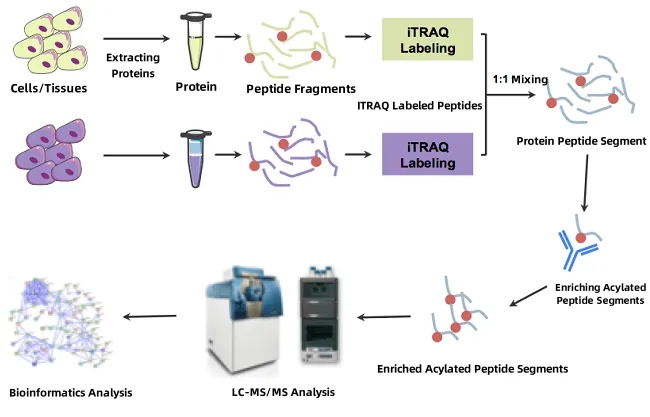Quantitative Acetylomics Analysis Service
Quantitative profiling of protein acetylation is indispensable for revealing how this reversible modification regulates cellular function and contributes to disease mechanisms. Quantitative Acetylomics Analysis Service at MtoZ Biolabs delivers accurate, reproducible, and large-scale measurement of acetylation dynamics, empowering discoveries in epigenetics, drug development, and biomarker research.
Overview
Acetylation is a reversible post-translational modification that fine-tunes protein activity, stability, and interactions. Beyond simple site mapping, quantitative acetylomics reveals how acetylation levels fluctuate under physiological conditions, stress, or drug treatment. These measurements provide critical insights into epigenetic regulation, signal transduction, and metabolic adaptation, making quantitative analysis indispensable for both fundamental and translational research.
Services at MtoZ Biolabs
MtoZ Biolabs offers Quantitative Acetylomics Analysis Service that integrates antibody-based peptide enrichment with cutting-edge quantitative proteomics approaches, including label-free workflows, SILAC, and TMT/iTRAQ labeling.
Our typical workflow includes:
1. Protein Extraction and Digestion
Samples are processed into peptides using standardized protocols for reproducibility.
2. Acetylated Peptide Enrichment
High-specificity immunoaffinity enrichment selectively captures acetylated peptides, with optional prefractionation to enhance coverage.
3. Quantitative LC–MS/MS Analysis
High-resolution Orbitrap platforms enable accurate and sensitive quantification using label-free or isobaric tagging strategies.
4. Bioinformatics and Statistical Interpretation
Differential analysis, pathway enrichment, and motif discovery provide meaningful biological insights.

Figure 1. Quantitative Acetylomics Analysis Workflow
Why Choose MtoZ Biolabs?
✔ Advanced Quantification Platforms: Orbitrap Fusion Lumos, Q Exactive HF, and Nano-LC for sensitive, high-resolution analysis.
✔ Reliable Enrichment Strategies: Antibody-based workflows that ensure specificity and reproducibility.
✔ Flexible Quantification Options: Label-free, TMT/iTRAQ, and SILAC tailored to your study design.
✔ Comprehensive Bioinformatics: From normalization to pathway mapping and visualization.
✔ Transparent Deliverables: Clear reporting with no hidden costs, ensuring confidence in every project.
Sample Submission Suggestions

Note: Provide details on sample collection and handling. If you need further details, our technical support team is happy to assist and provide comprehensive guidance on sample submission.
Applications
Our Quantitative Acetylomics Analysis Service supports a wide range of research needs, including:
Epigenetic Studies: Quantifying histone acetylation to investigate chromatin remodeling and transcriptional regulation.
Disease Mechanisms: Comparing acetylation profiles across cancer, neurological disorders, cardiovascular conditions, and metabolic syndromes.
Drug Mechanism Evaluation: Assessing the impact of HDAC inhibitors or other epigenetic drugs on global acetylation networks.
Systems Biology: Integrating quantitative acetylomics with phosphorylation, methylation, or ubiquitination to model PTM crosstalk.
FAQ
Q1: Which quantification method is best suited for my project?
It depends on your study design: TMT/iTRAQ for multiplexed cohorts, SILAC for cell culture models, and label-free workflows for flexible, cost-effective profiling.
Q2: Can this service be combined with other PTM analyses?
Yes. Our platform supports integrated studies, allowing researchers to explore acetylation alongside phosphorylation, methylation, or ubiquitination.
Quantitative Acetylomics Analysis Service at MtoZ Biolabs provides reliable and high-quality datasets that reveal the dynamic regulation of acetylation in health and disease. By integrating enrichment strategies, cutting-edge LC–MS/MS, and comprehensive bioinformatics, we empower researchers to uncover mechanisms, validate therapeutic targets, and accelerate scientific discovery.
Contact us today to discuss how our Quantitative Acetylomics Analysis Service can advance your research.







